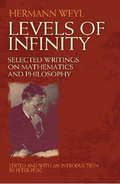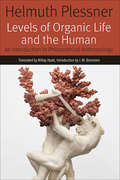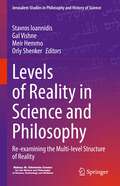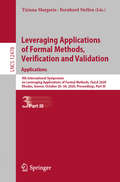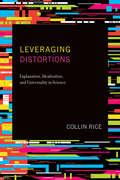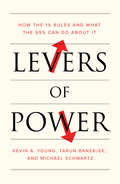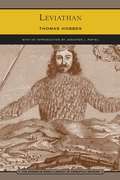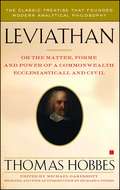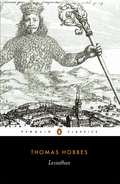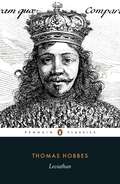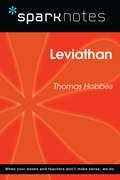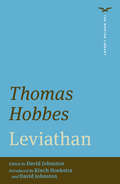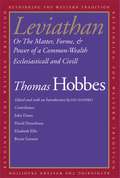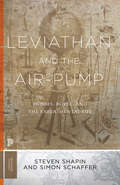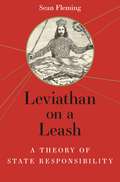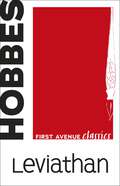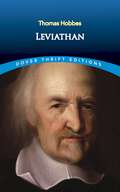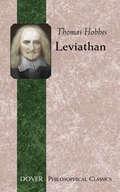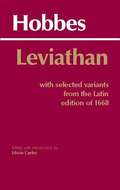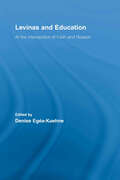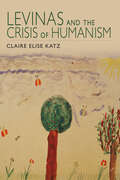- Table View
- List View
Levels of Infinity: Selected Writings on Mathematics and Philosophy (Dover Books on Mathematics)
by Hermann Weyl Peter PesicThis original anthology collects 10 of Weyl's less-technical writings that address the broader scope and implications of mathematics. Most have been long unavailable or not previously published in book form. Subjects include logic, topology, abstract algebra, relativity theory, and reflections on the work of Weyl's mentor, David Hilbert. 2012 edition.
Levels of Organic Life and the Human: An Introduction to Philosophical Anthropology (Forms of Living)
by Helmuth PlessnerThe most important work by a key figure in German thought, Helmuth Plessner’s Levels of Organic Life and the Human, originally published in 1928, appears here for the first time in English, accompanied by a substantial Introduction by J. M. Bernstein, after having served for decades as an influence on thinkers as diverse as Merleau-Ponty, Peter Berger, Habermas, and the new naturalists.The Levels, as it has long been known, draws on phenomenological, biological, and social scientific sources as part of a systematic account of nature, life, and human existence. The book considers non-living nature, plants, non-human animals, and human beings in turn as a sequence of increasingly complex modes of boundary dynamics—simply put, interactions between a thing’s insides and surrounding world. On Plessner’s unique account, living things are classed and analyzed by their “positionality,” or orientation to and within an environment. “Life” is thereby phenomenologically defined, and its universal yet internally variable features such as metabolism, reproduction, and death are explained.The approach provides a foundation not only for philosophical biology but philosophical anthropology as well. According to Plessner’s radical view, the human form of life is excentric—that is, the relation between body and environment is something to which humans themselves are positioned and can take a position. This “excentric positionality” enables human beings to take a stand outside the boundaries of their own body, a possibility with significant implications for knowledge, culture, religion, and technology.Plessner studied zoology and philosophy with Hans Driesch in the 1910s before embarking on a highly productive philosophical career. His work was initially obscured by the superficially similar views of Max Scheler and Martin Heidegger and by his forced exile during World War II. Only in recent decades, as scholarship has moved more squarely into engagement with issues like animality, embodiment, human dignity, social theory, the philosophy of technology, and the philosophy of nature, has the originality and depth of Plessner’s vision been appreciated.A powerful and sophisticated account of embodiment, the Levels shows, with reference both to science and to philosophy, how life can be seen on its own terms to establish its own boundaries, and how, from the standpoint of life, the human establishes itself in relation to the nonhuman. As such, the book is not merely a historical monument but a source for invigorating a range of vital current conversations around the animal, posthumanism, the material turn, and the biology and sociology of cognition.This modern philosophical classic, long-awaited in English translation, is a key book both historically and for today’s interest in understanding philosophy and social theory together with science, without reducing the former to the latter.
Levels of Reality in Science and Philosophy: Re-examining the Multi-level Structure of Reality (Jerusalem Studies in Philosophy and History of Science)
by Meir Hemmo Orly Shenker Stavros Ioannidis Gal VishneThis book offers a unique perspective on one of the deepest questions about the world we live in: is reality multi-leveled, or can everything be reduced to some fundamental ‘flat’ level? This deep philosophical issue has widespread implications in philosophy, since it is fundamental to how we understand the world and the basic entities in it. Both the notion of ‘levels’ within science and their ontological implications are issues that are underexplored in the philosophical literature. The volume reconsiders the view that reality contains many levels and opens new ways to understand the ontological status of the special sciences. The book focuses on major open questions that arise at the foundations of cognitive science, cognitive psychology, brain science and other special sciences, in particular with respect to the physical foundations of these sciences. For example: Is the mental computational? Do brains compute? How can the special sciences be autonomous from physics, grounded in, or based on, physics and at the same time irreducible to physics? The book is an important read for scientists and philosophers alike. It is of interest to philosophers of science, philosophers of mind and biology interested in the notion of levels, but also to psychologists, cognitive scientists and neuroscientists investigating such issues as the precise relation of the mental to the underlying neural structures and the appropriate approach to study it.
Leveraging Applications of Formal Methods, Verification and Validation: 9th International Symposium on Leveraging Applications of Formal Methods, ISoLA 2020, Rhodes, Greece, October 20–30, 2020, Proceedings, Part III (Lecture Notes in Computer Science #12478)
by Tiziana Margaria Bernhard SteffenThe three-volume set LNCS 12476 - 12478 constitutes the refereed proceedings of the 9th International Symposium on Leveraging Applications of Formal Methods, ISoLA 2020, which was planned to take place during October 20–30, 2020, on Rhodes, Greece. The event itself was postponed to 2021 due to the COVID-19 pandemic. The papers presented were carefully reviewed and selected for inclusion in the proceedings. Each volume focusses on an individual topic with topical section headings within the volume:Part I, Verification Principles: Modularity and (De-)Composition in Verification; X-by-Construction: Correctness meets Probability; 30 Years of Statistical Model Checking; Verification and Validation of Concurrent and Distributed Systems. Part II, Engineering Principles: Automating Software Re-Engineering; Rigorous Engineering of Collective Adaptive Systems. Part III, Applications: Reliable Smart Contracts: State-of-the-art, Applications, Challenges and Future Directions; Automated Verification of Embedded Control Software; Formal methods for DIStributed COmputing in future RAILway systems.
Leveraging Distortions: Explanation, Idealization, and Universality in Science
by Collin RiceAn examination of how scientists deliberately and justifiably use pervasive distortions of relevant features to explain and understand natural phenomena.A fundamental rule of logic is that in order for an argument to provide good reasons for its conclusion, the premises of the argument must be true. In this book, Collin Rice shows how the practice of science repeatedly, pervasively, and deliberately violates this principle. Rice argues that scientists strategically use distortions that misrepresent relevant features of natural phenomena in order to explain and understand--and that they use these distortions deliberately and justifiably in order to discover truths that would be otherwise inaccessible. Countering the standard emphasis on causation, accurate representation, and decomposition of science into its accurate and inaccurate parts, Rice shows that science's epistemic achievements can still be factive despite their being produced through the use of holistically distorted scientific representations. Indeed, he argues, this distortion is one of the most widely employed and fruitful tools used in scientific theorizing. Marshalling a range of case studies, Rice contends that many explanations in science are noncausal, and he presents an alternate view of explanation that captures the variety of noncausal explanations found across the sciences. He proposes an alternative holistic distortion view of idealized models, connecting it to physicists' concept of a universality class; shows how universality classes can overcome some of the challenges of multiscale modeling; and offers accounts of explanation, idealization, modeling, and understanding.
Levers of Power: How the 1% Rules and What the 99% Can Do About It
by Michael Schwartz Kevin A. Young Tarun BanerjeeUnderstanding the power of the corporations and how to take the struggle directly to themIt's no secret that "the 1%" - the business elite that commands the largest corporations and the connected network of public and private institutions- exercise enormous control over U.S. government. While this control is usually attributed to campaign donations and lobbying, Levers of Power argues that corporate power derives from control over the economic resources on which daily life depends. Government officials must constantly strive to keep capitalists happy, lest they go on "capital strike" - that is, refuse to invest in particular industries or locations, or move their holdings to other countries - and therefore impose material hardship on specific groups or the economy as a whole. For this reason, even politicians who are not dependent on corporations for their electoral success must fend off the interruption of corporate investment.Levers of Power documents the pervasive power of corporations and other institutions with decision-making control over large pools of capital, particularly the Pentagon. It also shows that the most successful reform movements in recent U.S. history - for workers' rights, for civil rights, and against imperialist wars - succeeded by directly targeting the corporations and other institutional adversaries that initiated and benefitted from oppressive policies. Though most of today's social movements focus on elections and politicians, movements of the "99%" are most effective when they inflict direct costs on corporations and their allied institutions. This strategy is also more conducive to building a revolutionary mass movement that can replace current institutions with democratic alternatives.
Leviathan
by Richard Tuck Thomas HobbesThomas Hobbes' Leviathan is arguably the greatest piece of political philosophy written in the English language. Written in a time of great political turmoil (Hobbes' life spanned the reign of Charles I, the Civil Wars, the Commonwealth and the Protectorate, and the Restoration), Leviathan is an argument for obedience to authority grounded in an analysis of human nature. Since its first publication in 1991 Richard Tuck's edition of Leviathan has been recognised as the single most accurate and authoritative text, and for this revised edition Professor Tuck has provided a much amplified and expanded introduction, which will provide students unfamiliar with Hobbes with a cogent and accessible introduction to this most challenging of texts. Other vital aids to study include an extensive guide to further reading, a note on textual matters, a chronology of important events and brief biographies of important persons mentioned in Hobbes' text.
Leviathan
by Thomas HobbesAfter the publication of his masterpiece of political theory, Leviathan (1651), opponents charged Thomas Hobbes with atheism and burned his books. The English Parliament even claimed that the theories found in Leviathan were a likely cause of the Plague of 1665 and the Great Fire of 1666. For the modern reader, though, Hobbes is more recognized for his popular belief that humanity's natural condition is a state of perpetual war, with life being "solitary, poor, nasty, brutish, and short."
Leviathan
by Thomas HobbesLeviathan is both a magnificent literary achievement and the greatest work of political philosophy in the English language. Permanently challenging, it has found new applications and new refutations in every generation.
Leviathan
by Thomas HobbesA cornerstone of modern western philosophy, addressing the role of man in government, society and religion In 1651, Hobbes published his work about the relationship between the government and the individual. More than four centuries old, this brilliant yet ruthless book analyzes not only the bases of government but also physical nature and the roles of man. Comparable to Plato's Republic in depth and insight, Leviathan includes two society-changing phenomena that Plato didn't dare to dream of -- the rise of great nation-states with their claims to absolute sovereignty, and modern science, with its unprecedented analytic power. To Hobbes, the leviathan -- a mythical sea creature described in the Old Testament -- represented his central thesis: that the state must be strong in order to control and protect its citizens. Even today, Hobbes's thesis in Leviathan is debated among scholars and philosophy aficionados around the globe. One of the earliest attempts at a genuinely scientific understanding of politics and society in their modern form, this book also remains one of the most stimulating. In his timeless work, Hobbes outlines his ideas about the passions and the conduct of man, and how his theories are realized in every individual. Addressing free will and religion, Hobbes constructs an intelligent argument for the basis of religion within government and how to organize a peaceful and successful Christian commonwealth. Like Plato's Republic, this book contains ideas on psychology, ethics, law, language, and religion that continue to challenge modern thinkers and exercise a profound influence on Western thought. A classic treatise of philosophy, Leviathan is critical reading for anyone who wishes to examine the human mind through the prisms of government and society.
Leviathan
by Thomas HobbesThe Leviathan is the vast unity of the State. But how are unity, peace and security to be attained? Hobbes's answer is sovereignty, but the resurgence of interest today in Leviathan is due less to its answers than its methods. Hobbes sees politics as a science capable of the same axiomatic approach as geometry: he argues from first principles to human nature to politics. This book's appeal to the twentieth century lies not just in its elevation of politics to a science, but in its overriding concern for peace.
Leviathan
by Thomas Hobbes'The life of man, solitary, poore, nasty, brutish, and short' Written during the chaos of the English Civil War, Thomas Hobbes' Leviathan asks how, in a world of violence and horror, can we stop ourselves from descending into anarchy? Hobbes' case for a 'common-wealth' under a powerful sovereign - or 'Leviathan' - to enforce security and the rule of law, shocked his contemporaries, and his book was publicly burnt for sedition the moment it was published. But his penetrating work of political philosophy opened up questions about the nature of statecraft and society that influenced governments across the world. Edited with an Introduction by Christopher Brooke
Leviathan (SparkNotes Philosophy Guide)
by SparkNotesLeviathan (SparkNotes Philosophy Guide) Making the reading experience fun! SparkNotes Philosophy Guides are one-stop guides to the great works of philosophy–masterpieces that stand at the foundations of Western thought. Inside each Philosophy Guide you&’ll find insightful overviews of great philosophical works of the Western world.
Leviathan (The Norton Library #0)
by Thomas HobbesAbout David Johnston’s edition Carefully and faithfully edited by “one of our most astute commentators on Hobbes’s political theory” (Jeremy Waldron), the Norton Library edition of Leviathan features the complete text of the work, with spelling and punctuation thoughtfully modernized and archaic terms helpfully annotated throughout. An introduction by Kinch Hoekstra situates the work in its historical and intellectual context to prepare students for their first serious encounter with “the greatest single work of political thought in the English language” (John Rawls).
Leviathan Or The Matter, Forme, & Power of a Common-Wealth Ecclesiasticall and Civill
by Thomas HobbesWritten by Thomas Hobbes and first published in 1651,Leviathanis widely considered the greatest work of political philosophy ever composed in the English language. Hobbes's central argument--that human beings are first and foremost concerned with their own fears and desires, and that they must relinquish basic freedoms in order to maintain a peaceful society--has found new adherents and critics in every generation. This new edition, which uses modern text and relies on large-sheet copies from the 1651 Head version, includes interpretive essays by four leading Hobbes scholars: John Dunn, David Dyzenhaus, Elisabeth Ellis, and Bryan Garsten. Taken together with Ian Shapiro's wide-ranging introduction, they provide fresh and varied interpretations ofLeviathanfor our time.
Leviathan and the Air-Pump: Hobbes, Boyle, and the Experimental Life (Princeton Classics #32)
by Steven Shapin Simon SchafferLeviathan and the Air-Pump examines the conflicts over the value and propriety of experimental methods between two major seventeenth-century thinkers: Thomas Hobbes, author of the political treatise Leviathan and vehement critic of systematic experimentation in natural philosophy, and Robert Boyle, mechanical philosopher and owner of the newly invented air-pump. The issues at stake in their disputes ranged from the physical integrity of the air-pump to the intellectual integrity of the knowledge it might yield. Both Boyle and Hobbes were looking for ways of establishing knowledge that did not decay into ad hominem attacks and political division. Boyle proposed the experiment as cure. He argued that facts should be manufactured by machines like the air-pump so that gentlemen could witness the experiments and produce knowledge that everyone agreed on. Hobbes, by contrast, looked for natural law and viewed experiments as the artificial, unreliable products of an exclusive guild. The new approaches taken in Leviathan and the Air-Pump have been enormously influential on historical studies of science. Shapin and Schaffer found a moment of scientific revolution and showed how key scientific givens--facts, interpretations, experiment, truth--were fundamental to a new political order. Shapin and Schaffer were also innovative in their ethnographic approach. Attempting to understand the work habits, rituals, and social structures of a remote, unfamiliar group, they argued that politics were tied up in what scientists did, rather than what they said. Steven Shapin and Simon Schaffer use the confrontation between Hobbes and Boyle as a way of understanding what was at stake in the early history of scientific experimentation. They describe the protagonists' divergent views of natural knowledge, and situate the Hobbes-Boyle disputes within contemporary debates over the role of intellectuals in public life and the problems of social order and assent in Restoration England. In a new introduction, the authors describe how science and its social context were understood when this book was first published, and how the study of the history of science has changed since then.
Leviathan on a Leash: A Theory of State Responsibility
by Sean FlemingNew perspectives on the role of collective responsibility in modern politicsStates are commonly blamed for wars, called on to apologize, held liable for debts and reparations, bound by treaties, and punished with sanctions. But what does it mean to hold a state responsible as opposed to a government, a nation, or an individual leader? Under what circumstances should we assign responsibility to states rather than individuals? Leviathan on a Leash demystifies the phenomenon of state responsibility and explains why it is a challenging yet indispensable part of modern politics.Taking Thomas Hobbes' theory of the state as his starting point, Sean Fleming presents a theory of state responsibility that sheds new light on sovereign debt, historical reparations, treaty obligations, and economic sanctions. Along the way, he overturns longstanding interpretations of Hobbes' political thought, explores how new technologies will alter the practice of state responsibility as we know it, and develops new accounts of political authority, representation, and legitimacy. He argues that Hobbes' idea of the state offers a far richer and more realistic conception of state responsibility than the theories prevalent today, and demonstrates that Hobbes' Leviathan is much more than an anthropomorphic "artificial man."Leviathan on a Leash is essential reading for political theorists, scholars of international relations, international lawyers, and philosophers. This groundbreaking book recovers a forgotten understanding of state personality in Hobbes' thought and shows how to apply it to the world of imperfect states in which we live.
Leviathan: Large Print (First Avenue Classics ™)
by Thomas HobbesDuring the upheaval of the English Civil War in the seventeenth century, political philosopher Thomas Hobbes composed his masterwork, Leviathan. It was first published in 1651, between the trial and execution of King Charles I and the creation of the Commonwealth of England under Oliver Cromwell. In his book, Hobbes argued that a strong and undivided central government was necessary to maintain societal order. By accepting the rule of a sovereign authority figure—which Hobbes called the "Leviathan" after the biblical sea monster—humans could avoid being ruled instead by self-interest and fear, and so escape humankind's natural state of war and violence. This is an unabridged version of Hobbes's most famous philosophical text, which established social contract theory and remained influential in political philosophy for centuries.
Leviathan: Or The Matter, Forme, And Power Of A Common-wealth Ecclesiastical And Civil (Dover Thrift Editions)
by Thomas HobbesWritten during a moment in English history when the political and social structures as well as methods of science were in flux and open to interpretation, Leviathan played an essential role in the development of the modern world. Thomas Hobbes, an outspoken royalist, fled to France during the English Civil War. There he wrote this polemic, in which he calls for a powerful sovereign — a "Leviathan" — to act as an enforcer of peace and justice. Hobbes's articulation of this long-contemplated philosophy of political and natural science was finally published in 1651, two years after the overthrow and execution of King Charles I. It met with a firestorm of controversy that included charges of treason and sedition, but survived to rank among the greatest works in the history of ideas. This edition of Hobbes's landmark work is based on the original text, offering both flavorful authenticity and the utmost clarity of expression.
Leviathan: The English And Latin Texts (Dover Philosophical Classics)
by Thomas HobbesThomas Hobbes took a new look at the ways in which society should function, and he ended up formulating the concept of political science. His crowning achievement, Leviathan, remains among the greatest works in the history of ideas. Written during a moment in English history when the political and social structures as well as methods of science were in flux and open to interpretation, Leviathan played an essential role in the development of the modern world.An outspoken royalist, Hobbes fled to France during the English civil war, where he wrote this polemic, in which he calls for a powerful sovereign — a "Leviathan" — to act as an enforcer of peace and justice. Hobbes' articulation of this long-contemplated philosophy of political and natural science was finally published in 1651, two years after the overthrow and execution of Charles I. It met with a firestorm of controversy that included charges of treason and sedition. This edition of Hobbes' landmark work is based on the original text. It incorporates the author's own corrections and retains the period spelling and punctuation, offering both flavorful authenticity and the utmost clarity of expression.
Leviathan: With Selected Variants From The Latin Edition Of 1668
by Thomas Hobbes Edwin M. CurleyDesigned to meet the needs of both student and scholar, this edition of Leviathan offers a brilliant introduction by Edwin Curley, modernized spelling and punctuation of the text, and the inclusion, along with historical and interpretive notes, of the most significant variants between the English version of 1651 and the Latin version of 1668. A glossary of seventeenth-century English terms, and indexes of persons, subjects, and scriptural passages help make this the most thoughtfully conceived edition of Leviathan available.
Levinas and Analytic Philosophy: Second-Person Normatvity and the Moral Life (Routledge Research in Phenomenology)
by Michael Fagenblat Melis ErdurThis volume examines the relevance of Emmanuel Levinas’s work to recent developments in analytic philosophy. Contemporary analytic philosophers working in metaethics, the philosophy of mind, and the metaphysic of personal identity have argued for views similar to those espoused by Levinas. Often disparately pursued, Levinas’s account of "ethics as first philosophy" affords a way of connecting these respective enterprises and showing how moral normativity enters into the structure of rationality and personal identity. In metaethics, the volume shows how Levinas’s moral phenomenology relates to recent work on the normativity of rationality and intentionality, and how it can illuminate a wide range of moral concepts including accountability, moral intuition, respect, conscience, attention, blame, indignity, shame, hatred, dependence, gratitude and guilt. The volume also tests Levinas’s innovative claim that ethical relations provide a way of accounting for the irreducibility of personal identity to psychological identity. The essays here contribute to ongoing discussions about the metaphysical significance and sustainability of a naturalistic but nonreductive account of personhood. Finally, the volume connects Levinas’s second-person standpoint with analogous developments in moral philosophy.
Levinas and Education: At the Intersection of Faith and Reason (Routledge International Studies in the Philosophy of Education)
by Denise Egea-KuehneThis first book-length collection on Levinas and education gathers new texts written especially for this volume by an international group of scholars well known for their work in philosophy, educational theory, and on Levinas. It provides an introduction to some of Levinas's major themes of ethics, justice, hope, hospitality, forgiveness and more, as its contributing authors address some fundamental educational issues such as: what it means to be a teacher; what it means to learn from a teacher; the role of language in the curriculum; literature, ethics, and education; moral education and human relations in schools; ethics of responsibility and philosophical-pedagogical discourse; educational hospitality and interculturalism; unconditional responsibility and education; educating for participatory democratic citizenship; the pedagogy of peace; logic, rationality, and ethics; connecting teaching to spirituality. Levinas always insisted that his aim was not to provide "a program," and accordingly, it is not the intent of the authors to look in Levinas's texts for a set of guidelines, rules, or precepts to be applied to education. Rather, this study invites educators, and researchers in philosophy and philosophy of education, to a thoughtful and critical reading of Levinas, and to engage with his unique style of analysis and questioning as they uncover with these authors the necessity and the possibility of thinking education anew in terms of ethics, justice, responsibility, hope and faith.
Levinas and the Cinema of Redemption: Time, Ethics, and the Feminine (Film and Culture Series)
by Sam GirgusIn his philosophy of ethics and time, Emmanuel Levinas highlighted the tension that exists between the "ontological adventure" of immediate experience and the "ethical adventure" of redemptive relationships-associations in which absolute responsibility engenders a transcendence of being and self. In an original commingling of philosophy and cinema study, Sam B. Girgus applies Levinas's ethics to a variety of international films. His efforts point to a transnational pattern he terms the "cinema of redemption" that portrays the struggle to connect to others in redeeming ways. Girgus not only reveals the power of these films to articulate the crisis between ontological identity and ethical subjectivity. He also locates time and ethics within the structure and content of film itself. Drawing on the work of Luce Irigaray, Tina Chanter, Kelly Oliver, and Ewa Ziarek, Girgus reconsiders Levinas and his relationship to film, engaging with a feminist focus on the sexualized female body. Girgus offers fresh readings of films from several decades and cultures, including Frank Capra's Mr. Smith Goes to Washington (1939), Federico Fellini's La dolce vita (1959), Michelangelo Antonioni's L'avventura (1960), John Huston's The Misfits (1961), and Philip Kaufman's The Unbearable Lightness of Being (1988).
Levinas and the Crisis of Humanism
by Claire Elise KatzReexamining Emmanuel Levinas's essays on Jewish education, Claire Elise Katz provides new insights into the importance of education and its potential to transform a democratic society, for Levinas's larger philosophical project. Katz examines Levinas's "Crisis of Humanism," which motivated his effort to describe a new ethical subject. Taking into account his multiple influences on social science and the humanities, and his various identities as a Jewish thinker, philosopher, and educator, Katz delves deeply into Levinas's works to understand the grounding of this ethical subject.
